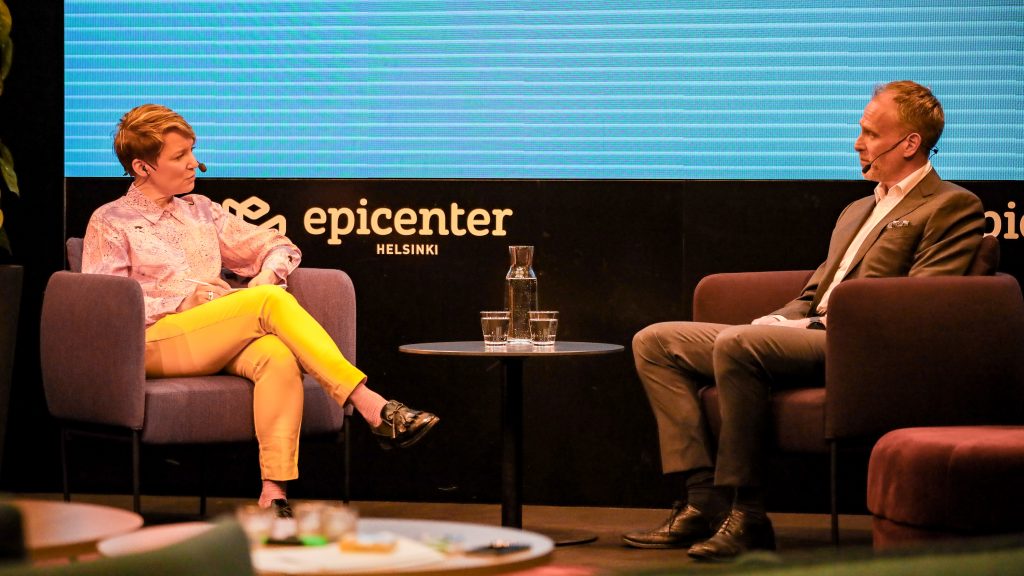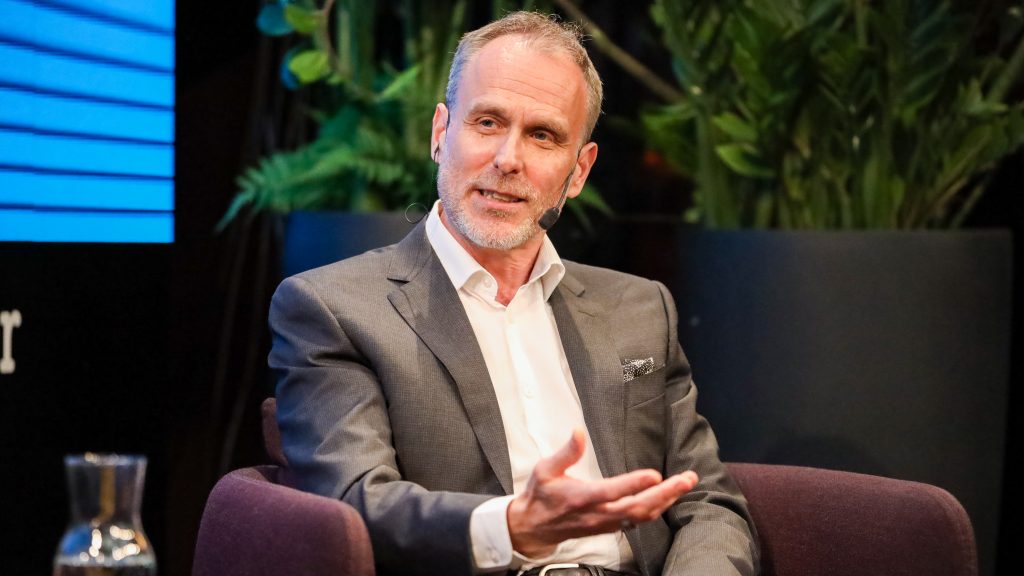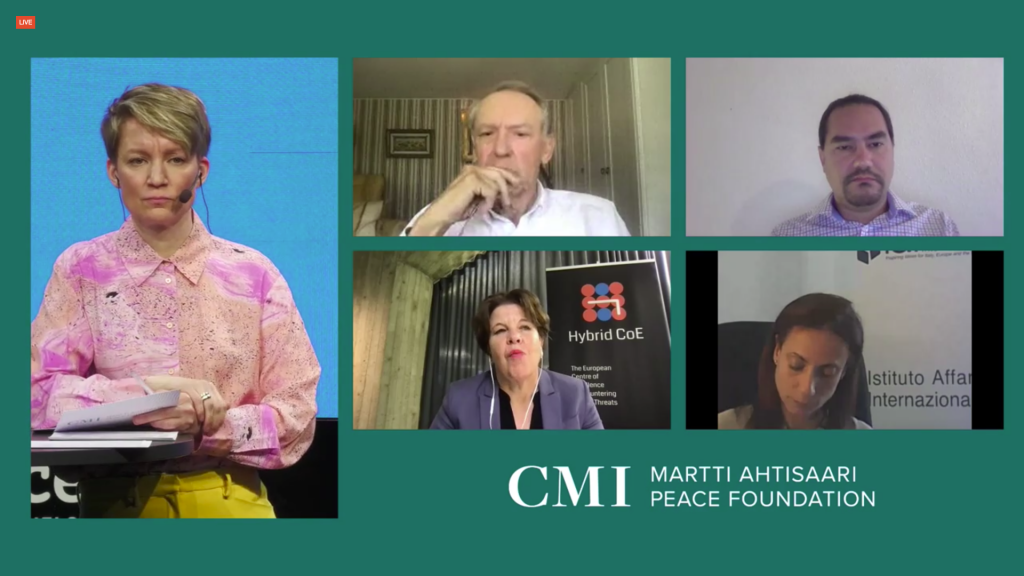Charting a new road to a more peaceful world
The pandemic has exposed how fragile the world is. A CMI webinar ‘Investing in peace after the pandemic – why and how?’, held 18 May, discussed the opportunity presented by the pandemic to chart a new path ahead. Governments and international institutions should refocus their efforts on peacemaking, putting the needs of people living in conflict-afflicted areas first. “We want to engage all those who can contribute the resolution of a conflict and treat everyone as a human being”, said CMI’s new CEO Janne Taalas.

Katri Makkonen interviewed CMI’s new CEO Janne Taalas. Photo: Olli Puumalainen.
Despite the challenges, CMI has managed to adapt to the new reality created by the global pandemic. The transformation from an association to CMI – Martti Ahtisaari Peace Foundation and a new strategy until 2030 will guide the way to the next decade of peacemaking.
CMI has been able to continue its work by convening conflict parties virtually and by creating safe physical environments for meetings. In 2020, CMI had 23 projects worldwide and made 28 tangible contributions to peace, resulting in better peace processes, better peacemakers and better ways of building peace.
“We haven’t stopped because of the pandemic. In fact we argue that the pandemic will intensify the necessity, importance and significance of the work we do at CMI,” said CMI Board Chair Alexander Stubb in his opening remarks at the webinar.
Stubb said that CMI’s enduring vision is that all conflicts can be resolved. “We believe that people have the capacity to pursue peaceful change, even amid cyclical forms of violence, as in the case of the Israel-Palestine conflict.
“What people have started, people can end. And that is why CMI – Martti Ahtisaari Peace Foundation exists.”

CMI’s CEO Janne Taalas remains optimistic that the pandemic presents scope for change. “There is a strong feeling of common humanity, that we are all connected.” Photo: Olli Puumalainen.
Pandemic presents scope for change
The pandemic has exposed how fragile the world is, exacerbating old and producing new tensions across the world. CMI’s new CEO Janne Taalas spoke of the growing inequalities and diminishing political space taking place under the guise of stopping the spread of Covid-19 in conflict and conflict-prone countries.
Peacemakers must work to ensure that women and young people have a voice in the post-Covid-19 world. The changing character of conflicts also underscores the need to engage non-state armed groups that have become major protagonists.
“As an independent, Finnish organisation we’re well placed to be as inclusive as possible in our efforts. We want to engage all those who can contribute the resolution of a conflict and treat everyone as a human being. This is the legacy of CMI’s founder, President Martti Ahtisaari and is part of our Finnish DNA,” said Taalas.
A panel discussion at the webinar highlighted the opportunity presented by the pandemic to chart a new road to a more peaceful world. Meeting people’s basic needs and taking care of their security should be a priority in addressing the root causes of tensions and building sustainable peace.
“The pandemic has given a more human lens to conflict,” said Natalia Tocci, Director of the Istituto Affari Internazionali and Honorary Professor at the University of Tübingen.
Jan Eliasson, Chair of the governing Board of the Stockholm International Peace Research Institute and Former Deputy Secretary-General of the United Nations, said that the pandemic must serve as a wake-up call for governments and international institutions to deliver in building a better future for us all. “We must expect much more from our leaders,” said Eliasson.

The pandemic has diminished international attention to conflicts, the panelists stressed. More efforts and investments in peacemaking are urgently needed.
Need for outward-looking vision
But at present, the panelists stressed, countries have become more inward looking due to the pandemic, with governments and citizens focusing on overcoming the immediate crisis on their home turf. “Interest in issues of global peace and security has gone dramatically down during the pandemic. Very little international attention is devoted to conflicts,” said Tocci.
Teija Tiilikainen, Director of the European Centre of Excellence for Countering Hybrid Threats, said that the crisis has intensified international competition. The pandemic has been used to promote state interests, not the common interest of mankind, Tiilikainen said.
The UN Security Council should act as the ultimate arbiter of conflicts, but great power rivalry has paralysed it in many ways in the face of major crisis. Tocci pointed to the Israel-Palestine conflict as the latest example of its inability to act. Instead, and as a sign of an emerging new world order, China has offered to mediate in the conflict.
The panelists called for more international efforts and investments in peacemaking. Tocci urged the EU to take a more prominent role. “As Europeans we can’t insulate ourselves from crises that surround us.”
Denis Matveev, CMI’s Senior Advisor, highlighted the role of independent peacemakers in engaging with conflict parties and raising awareness on different crises. “While the world is not watching we need to be the ones who are creating those connections and creating that understanding”, said Matveev.
Teija Tiilikainen also saw a space for global civil movement to revitalize international cooperation to address global problems.
In his concluding remarks for the webinar, Ville Skinnari, Minister for Development Cooperation and Foreign Trade, reaffirmed Finland’s growing commitment to peace mediation. He said that the pandemic has made conflicts more complex.
“Conflict prevention and resolution are urgently needed in many parts of the world. Countries like Finland – impartial, pragmatic problem-solvers that take the do-no-harm principle seriously – can make a real difference.”
Find the full recording of the webinar here.